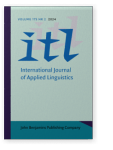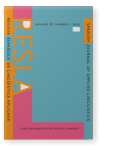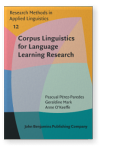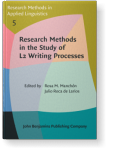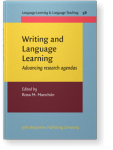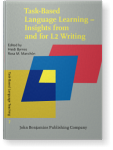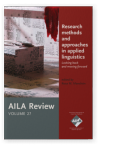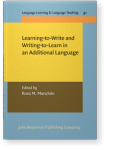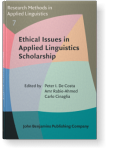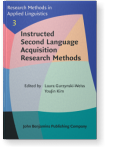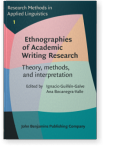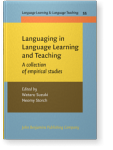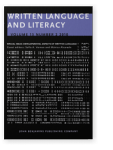Rosa M. Manchón
List of John Benjamins publications for which Rosa M. Manchón plays a role.
Journals
Book series
Research Methods in the Study of L2 Writing Processes
Edited by Rosa M. Manchón and Julio Roca de Larios
[Research Methods in Applied Linguistics, 5] 2023. vi, 387 pp.
Subjects Applied linguistics | Language acquisition | Multilingualism | Writing and literacy
Writing and Language Learning: Advancing research agendas
Edited by Rosa M. Manchón
[Language Learning & Language Teaching, 56] 2020. vii, 432 pp.
Subjects Applied linguistics | Language acquisition | Language teaching | Writing and literacy
Task-Based Language Learning – Insights from and for L2 Writing
Edited by Heidi Byrnes and Rosa M. Manchón
[Task-Based Language Teaching, 7] 2014. xi, 312 pp.
Subjects Applied linguistics | Language acquisition | Language teaching | Writing and literacy
Research methods and approaches in Applied Linguistics: Looking back and moving forward. AILA Review, Volume 27
Edited by Rosa M. Manchón
[AILA Review, 27] 2014. iii, 104 pp.
Subjects Applied linguistics
Learning-to-Write and Writing-to-Learn in an Additional Language
Edited by Rosa M. Manchón
[Language Learning & Language Teaching, 31] 2011. xii, 263 pp.
Subjects Applied linguistics | Language acquisition | Language teaching
2024 Chapter 19. The ethical gray area: Journal editors’ perspectives Ethical Issues in Applied Linguistics Scholarship, De Costa, Peter I., Amr Rabie-Ahmed and Carlo Cinaglia (eds.), pp. 341–354 | Chapter
This chapter is a collective reflection on key ethical dilemmas encountered by four past and/or current editors of journals in diverse sub-fields of Applied Linguistics. We reflect on (i) our understanding of ethics in relation to journal editing; (ii) specific ethical challenges we faced in our… read more
2023 Chapter 11. Affordances and limitations when using Inputlog to study young learners’ pausing behavior in L2 writing Research Methods in the Study of L2 Writing Processes, Manchón, Rosa M. and Julio Roca de Larios (eds.), pp. 224–246 | Chapter
This chapter focuses on methodological considerations in a study in which keystroke-logging data was used for the analysis of young English as a foreign language (EFL) learners’ pausing behavior while writing in their L2. We first present the rationale behind the study and subsequently discuss… read more
2023 Chapter 1. The study of L2 writing processes: Lines and methods of inquiry Research Methods in the Study of L2 Writing Processes, Manchón, Rosa M. and Julio Roca de Larios (eds.), pp. 6–31 | Chapter
This introductory chapter serves two main purposes. One is to contextualize the book within the larger professional discussion, which we do through a look-back approach in order to provide a synthetic review of the main lines of research in the study of L2 writing processes and the main research… read more
2023 Chapter 16. Analysing L2 writers’ processing of written corrective feedback via written languaging and think-aloud protocols: Methodological considerations Research Methods in the Study of L2 Writing Processes, Manchón, Rosa M. and Julio Roca de Larios (eds.), pp. 337–363 | Chapter
This chapter provides a reflection on the methodological decisions taken in a study that investigated the affordances of diverse data collection procedures for inspecting depth of processing of written corrective feedback, namely think-aloud protocols, written languaging, and a combination of… read more
2022 Chapter 13. Writing: Researching L2 writing as a site for learning in instructed settings Instructed Second Language Acquisition Research Methods, Gurzynski-Weiss, Laura and YouJin Kim (eds.), pp. 305–328 | Chapter
This chapter first provides a brief overview of the current state of L2 writing research conducted in or relevant for L2 learning programs in three areas: (1) L2 learning processes and outcomes associated with instructional interventions via the manipulation of tasks; (2) L2 learning processes… read more
2021 Chapter 5. The contribution of ethnographically-oriented approaches to the study of L2 writing and text production processes Ethnographies of Academic Writing Research: Theory, methods, and interpretation, Guillén-Galve, Ignacio and Ana Bocanegra-Valle (eds.), pp. 83–104 | Chapter
This chapter synthesizes trends in the study of writing and text production processes, and presents an analysis of the contribution that ethnographically-oriented research can make to professional discussions in this domain. It is suggested that the affordances of ethnographic approaches should… read more
2020 Chapter 7. Effects of task repetition with the aid of direct and indirect written corrective feedback: A longitudinal study in an out-of-school context Writing and Language Learning: Advancing research agendas, Manchón, Rosa M. (ed.), pp. 145–182 | Chapter
This study sheds light on the learning affordances of task repetition in writing by analyzing the effects of exact task repetition (2 iterations of the same task) and procedural task repetition (2 task types, each one performed twice over 6 months) aided with written corrective feedback (WCF).… read more
2020 Chapter 10. Processing output during individual L2 writing tasks: An exploration of depth of processing and the effects of proficiency Writing and Language Learning: Advancing research agendas, Manchón, Rosa M. (ed.), pp. 231–254 | Chapter
The present study explored the different levels of processing as well as the strategic orientation involved in the language-related episodes identified in the think-aloud protocols produced by 21 EFL writers (divided into three proficiency groups: pre-intermediate, intermediate and advanced)… read more
2020 Chapter 17. The language learning potential of L2 writing: Moving forward in theory and research Writing and Language Learning: Advancing research agendas, Manchón, Rosa M. (ed.), pp. 405–426 | Chapter
In this final chapter I articulate how the book contributes to advancing previous intersectional work between the fields of L2 writing and ISLA/SLA. To this end, I discuss the volume’s expansion of theoretical and empirical knowledge on writing as a site for language development in terms of (a)… read more
2020 Chapter 1. Writing and language learning: Looking back and moving forward Writing and Language Learning: Advancing research agendas, Manchón, Rosa M. (ed.), pp. 3–26 | Chapter
This introductory chapter serves two main purposes. One is to contextualize the book within the larger professional discussion, which entails a look back approach in order to provide a synthetic review of key milestones and developments in the study of writing as a site for language learning. The… read more
2020 Chapter 14. An ISLA perspective on L2 learning through writing: Implications for future research agendas Writing and Language Learning: Advancing research agendas, Manchón, Rosa M. (ed.), pp. 335–356 | Chapter
This chapter argues for the relevance of framing L2 writing research associated with language learning as part of a language curriculum within an instructed second language acquisition (ISLA) perspective. In line with current ISLA theorizing, we argue that the field should prioritize the conduct… read more
2020 Chapter 11. L2 writers’ processing of written corrective feedback: Depth of processing via written languaging Languaging in Language Learning and Teaching: A collection of empirical studies, Suzuki, Wataru and Neomy Storch (eds.), pp. 241–266 | Chapter
In this study we investigated (i) whether levels of depth of processing (DoP) are mediated by writing conditions (individual vs. collaborative writing), and (ii) the relationship between DoP and accuracy measures in the texts produced before and after processing feedback. Participants (118… read more
2020 Chapter 6. The effects of task repetition across modalities and proficiency levels Writing and Language Learning: Advancing research agendas, Manchón, Rosa M. (ed.), pp. 121–144 | Chapter
Research on task repetition (TR) has consistently showed beneficial effects for L2 oral production in terms of CAF measures (complexity, accuracy, and fluency). However, open questions exist regarding the modality-dependency and proficiency-dependency of TR learning affordances. To advance… read more
2020 Chapter 8. Task modality, communicative adequacy and CAF measures: The moderating role of task complexity Writing and Language Learning: Advancing research agendas, Manchón, Rosa M. (ed.), pp. 183–206 | Chapter
In this study we looked into the learning affordances of task modalities as mediated by task complexity. A group of intermediate learners performed an argumentative task with two levels of complexity orally and in writing and their performance was rated for adequacy, and assessed in terms of the… read more
2014 Task, task performance, and writing development: Advancing the constructs and the research agenda Task-Based Language Learning – Insights from and for L2 Writing, Byrnes, Heidi and Rosa M. Manchón (eds.), pp. 267–299 | Article
This closing chapter aims to assess the contribution of the book to TBLT theory and research and to put forward directions for advancing TBLT constructs and research agendas. We consider the volume’s overall contribution to the TBLT field to lie in linking the psycholinguistic with the textual,… read more
2014 Task-based language learning: Insights from and for L2 writing - an introduction Task-Based Language Learning – Insights from and for L2 Writing, Byrnes, Heidi and Rosa M. Manchón (eds.), pp. 1–23 | Article
In this introduction we provide an overview of the intended contribution of the volume to TBLT theory and research. It starts from the perspective that TBLT-oriented theoretical framing and explicitly theorized empirical research endeavours have, in general, taken oral communication as their main… read more
2014 From the Editor Research methods and approaches in Applied Linguistics: Looking back and moving forward, Manchón, Rosa M. (ed.), pp. 1–4 | Article
2014 The internal dimension of tasks: The interaction between task factors and learner factors in bringing about learning through writing Task-Based Language Learning – Insights from and for L2 Writing, Byrnes, Heidi and Rosa M. Manchón (eds.), pp. 27–52 | Article
This chapter considers how an “internal dimension of tasks” can both shed new light on the relationship between task interpretation, task performance, and learning outcomes, and advance the research agenda on task learning with worthwhile new empirical questions. Building on an expanded notion of… read more
2011 Chapter 4. Writing to learn the language: Issues in theory and research Learning-to-Write and Writing-to-Learn in an Additional Language, Manchón, Rosa M. (ed.), pp. 61–82 | Article
This chapter offers an overview of several strands of existing research addressing various aspects of L2 writing and SLA so as to be able to trace signs, both overtly provided by the authors or implicitly emerging from their arguments, of a shared interest in what I call the language learning… read more
2011 Chapter 1. Situating the learning-to-write and writing-to-learn dimensions of L2 writing Learning-to-Write and Writing-to-Learn in an Additional Language, Manchón, Rosa M. (ed.), pp. 3–14 | Article
This introductory chapter to the book serves to set the scene for both the three strands of research reviewed in Part I (learning to write, writing to learn content, and writing to learn language), and for the empirical studies contained in Part II. It does so by situating the learning-to-write and… read more
2011 Chapter 9. Writing to learn in FL contexts: Exploring learners’ perceptions of the language learning potential of L2 writing Learning-to-Write and Writing-to-Learn in an Additional Language, Manchón, Rosa M. (ed.), pp. 181–207 | Article
The study reported in this chapter set out to investigate 18 EFL learners’ own perceptions of the language learning potential of L2 writing, and the actions they reported taking to make the most of the learning opportunities afforded by their engagement with writing. Data for the study came from… read more
2010 Review of Torrance, Van Waes & Galbraith (2007): Writing and cognition: Research and applications Developmental aspects of written language, Vernon Carter, Sofía A. and Mónica Alvarado (eds.), pp. 282–286 | Review
